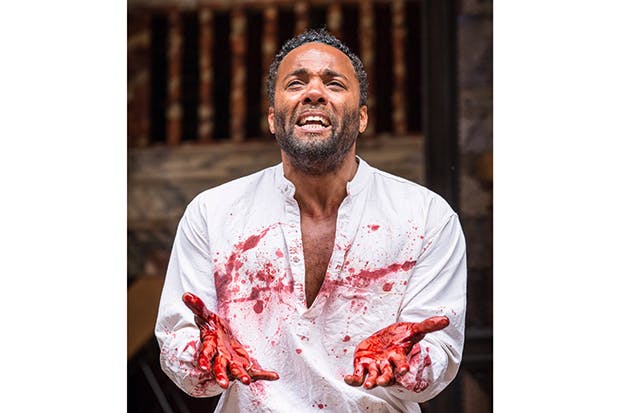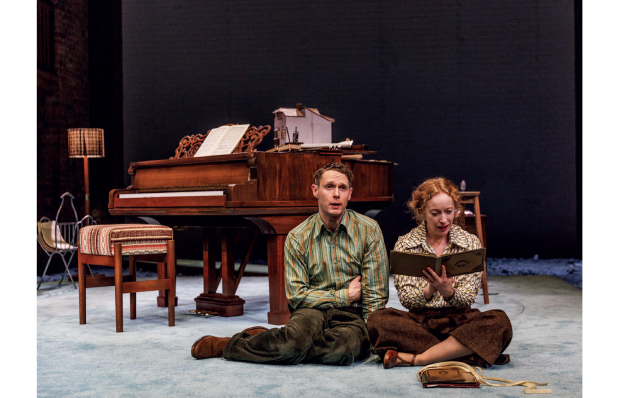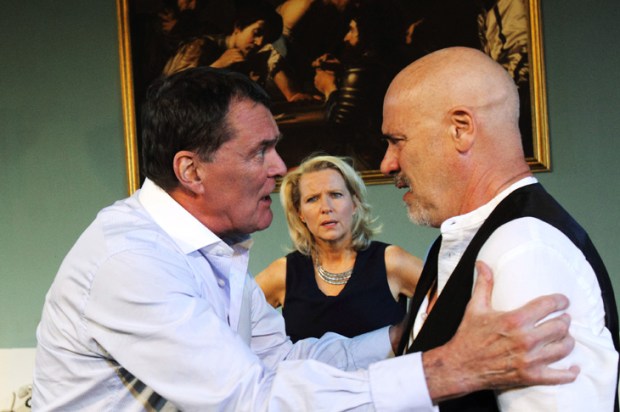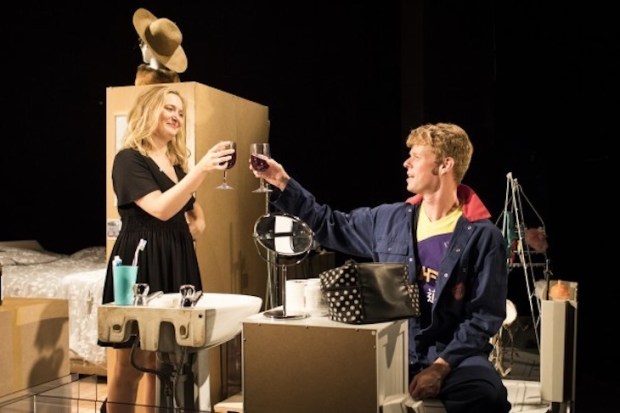Mike Bartlett’s curious blank-verse drama Charles III became an international hit. His new effort examines the cut-throat world of dark-web espionage. An American traitor named Andrew (Edward Snowden presumably) is hiding out in a Moscow hotel. Enter a flirty, giggling Irishwoman played by Caoilfhionn Dunne, who claims to be British and who teases Andrew over his betrayal of his homeland’s secrets. She evinces an interest in Oscar Wilde and the pair lock horns over footling minutiae. Andrew points out that Barbie dolls are called Sindy in the UK and this seems to demonstrate his familiarity with Britain. But he fails to spot the false cadences of her accent and he doesn’t query her use of the strange term ‘British Metropolitan Police’. And the name ‘Nick Leeson’ means nothing to him.
Their aimless and inconsistent conversation is mystifying. Are the errors intended as clues to a brilliant cat-and-mouse game or are they just the blunders of a scribbler past his deadline? The Irishwoman hints at a crush on Andrew but her invitations are aggressively farcical. ‘A boyfriend?’ she guffaws. ‘No, I have a relationship with a horse.’ She also claims to be negotiating on behalf of an unnamed figure hiding away in a London embassy (Assange presumably), but she doesn’t explain how a fugitive seeking sanctuary in Britain might influence the fate of an American refugee in Moscow. Just as baffling is the choice of the Russian authorities to hand this valuable defector over to an Irish conwoman rather than parading him in triumph before the world’s press. The writer has clearly realised that his garbled back story requires some justification and his remedy is to make Andrew profoundly dim. ‘I think you’re a little bit stupid,’ as the Irishwoman puts it. This useful improbability is a licence to send the dialogue wandering up a multitude of blind alleys.
After a great wodge of flippant Irish jabber, a Scots interrogator (played by John Mckay) arrives to goad Andrew with a little more menace. He feeds him some chocolate. That’s poisoned, he says, you’re going to die. Oh no, he corrects himself, that’s not poisoned, you’re not going to die. Obtuse circularities like this are the staple of bad sitcom, not of gripping psychological drama. The play closes with a series of physical stunts and on-stage tricks whose purpose is to conceal the vacuum left by the bungled narrative. Nothing has changed except the location. Where are we now? No idea. Is this a hotel? Maybe not. Are we even in Moscow? God knows. Why did Andrew not spot this? Too thick. A huge screed of cud-like verbiage has been spewed out but the storyline hasn’t moved an inch. Had the Irishwoman produced a gun and said, ‘Obey me or else,’ at the start of the play we might have reached the closing position after ten seconds rather than 100 minutes. What a curious night. A spy thriller by a writer with no knowledge of spying or thrilling.
Iqbal Khan’s Macbeth is an eye-catching mélange of retro stylings. The Globe looks like a Berlin nightclub with the fat pillars jacketed by black metal facings that open out into benches at ground level to facilitate flirtation. The soldiers wear smart, swishy tunics with Ruritanian ornaments while Lady Macbeth (Tara Fitzgerald) looks sumptuous in a wife-swapper’s gown of crimson velvet. A backing group warble out Celtic Twilight tunes.
This is a serious-minded and faithful production whose cast have been permitted to josh the audience with the occasional ad-lib. Not too often. Just enough. Ray Fearon flings himself into the title role with absorbing muscularity but I missed the killer instinct. He has poise and charm, a natural sweetness, and an elevated melancholy, but these qualities would suit the Dane better than the thane. His declamatory style — beautifully musical — feels like a Windsor Castle recital rather than the desperate outpourings of a newly hatched tyrant at Cawdor.
Khan is a little too smitten by his conceptual set-pieces and he overplays Banquo’s ghost. Shakespeare creates a scene with three centres of interest: Macbeth’s panic, his guests’ alarm and Lady Macbeth’s cover-up operation. To add a fourth by jazzing up the ghost creates more on-stage spectacle than the eye can easily absorb. Khan unfurls a thunderous black groundsheet the size of a squash court from beneath which a human contour surges up through a trapdoor. Is that Banquo or David Copperfield? And the sound is troublesome. Amplifiers have been given to the band but not to the actors so a lot of lines are drowned out or vanish in the Globe’s upper recesses. The musical additions, though fine in themselves, come at the wrong moments. This is a play whose dramatic peaks can’t benefit from supplementary effects. No one takes an orchestra up Everest to improve the view.
Got something to add? Join the discussion and comment below.
Get 10 issues for just $10
Subscribe to The Spectator Australia today for the next 10 magazine issues, plus full online access, for just $10.














Comments
Don't miss out
Join the conversation with other Spectator Australia readers. Subscribe to leave a comment.
SUBSCRIBEAlready a subscriber? Log in